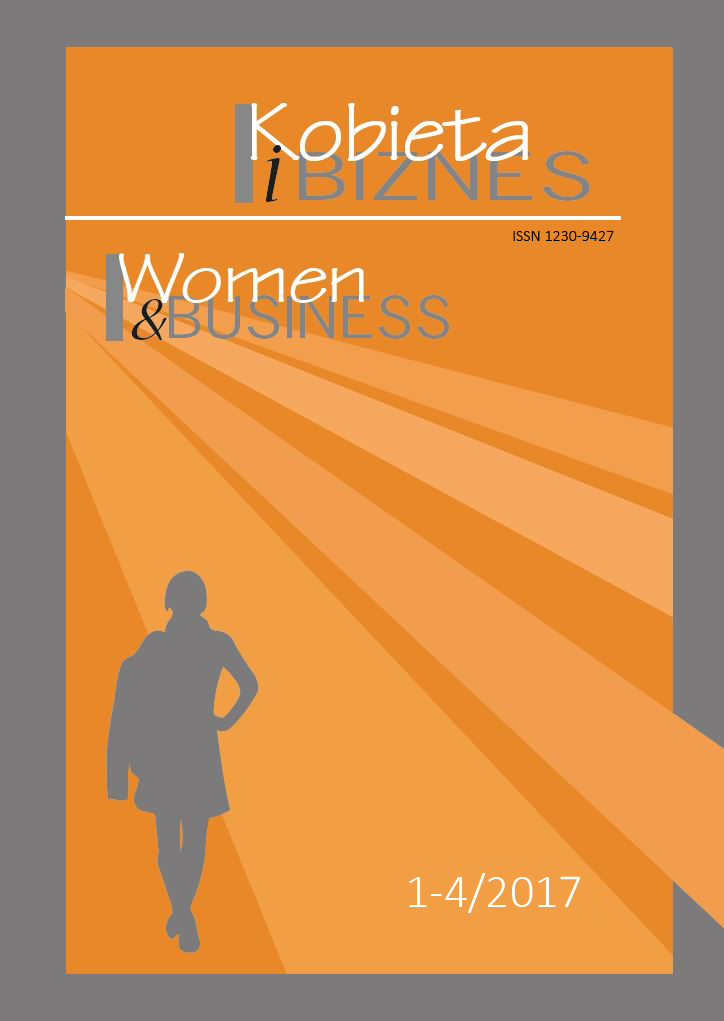Gender and ethnic origin: Opportunities and barriers in international professional career
Main Article Content
Abstract
The leading goal of this paper is to attempt to answer the question whether gender and ethnic origin have an influence on the international professional career of an individual. Since 1989 Poland has been affected by the changes taking place worldwide in the wake of rampant globalisation. The country’s accession to the European Union has opened new labour markets, an opportunity that Polish people are eagerly taking advantage of. At the same time, Poland has become home to international corporations, which have transformed its economy to a considerable extent. These processes involve the active participation of women. Their social position, professional opportunities, as well as related expectations and challenges have undergone a substantial change. The first part contains an overview of literature on gender and ethnic origin and discusses the most significant concepts related to culture and its dimensions according to G. Hofstede, as well as with culturally-conditioned social roles. The second part presents the results of the author’s research on the influence of gender and ethnic origin on international professional career, taking into account the research method applied. The final part indicates possible practical implications and potential directions for further research. (fragment of the text)
Article Details
Authors retain copyright and grant the journal right of first publication with the work simultaneously licensed under a Creative Commons Attribution License that allows others to share the work with an acknowledgement of the work's authorship and initial publication in this journal. All authors agree for publishing their email adresses, affiliations and short bio statements with their articles during the submission process.
Author agrees to share his work under CC-BY-NC license.
References
2. Burszta W.J. [1998], Antropologia kultury, Zysk i S-ka, Poznań.
3. Collins R. [1979], The Credential Society. A Historical Sociology of Education and Stratification, Academic Press, New York.
4. Dancewicz B. [2015a], Tam ojczyzna moja, gdzie serce moje. Przyczynek do badań nad tożsamością młodych, wykształconych Polaków mieszkających w Londynie, in: Młodzież w społeczeństwie wielokulturowym. Od małej ojczyzny do globalnego świata, ed. D. Wiśniewski, Difin, Warsaw.
5. Dancewicz B. [2015b], Zachowania etyczne w przedsiębiorstwach międzynarodowych a społeczna odpowiedzialność biznesu, SAN, Łodź.
6. Gawrycka M., Wasilczuk J., Zwiech P. [2008], Szklany sufit i szklane ruchome schody – kobiety na rynku pracy, CEDEWU.PL, Warszawa.
7. Goodman N. [2000], Wstęp do socjologii, Wydawnictwo Zysk i S-ka, Poznań.
8. Herder J. [2000], Myśli o filozofii dziejów, Dom Wydawniczy Elipsa, Warsaw.
9. Hofstede G., Hofstede G.J., Minkov M. [2011], Kultury i organizacje, PWE, Warsaw.
10. Katan D. [1999], Translating Cultures, St. Jerome Publishing, Manchester.
11. Kłoskowska A. [1996], Kultury narodowe u korzeni, Wydawnictwo Naukowe PWN, Warsaw.
12. Kobieta i władza w biznesie [2012], Deloitte, Warsaw.
13. Kobiety na rynku pracy [2017], Hays, Warsaw.
14. Kroeber A.I. [2002], Istota kultury, Wydawnictwo Naukowe PWN, Warsaw.
15. Linton R. [1975], Kulturowe podstawy osobowości, PWN, Warsaw.
16. Lisowska E. [2010], Równouprawnienie kobiet i mężczyzn w społeczeństwie, SGH, Warsaw.
17. McLuhan M. [1968], War and Peace in the Global Village, Bantam Books, New York.
18. Ornacka K., Mańka J. [2011], Gender mainstreaming w wybranych obszarach dyskryminacji w Polsce, w: Gender w społeczeństwie polskim, ed. K. Slany, J. Sruzik, K. Wojnicka, NOMOS, Kraków.
19. Paleczny T. [2008], Socjologia tożsamości, Oficyna Wydawnicza AFN, Kraków.
20. Parsons T. [2009], System społeczny, Nomos, Kraków.
21. Sułkowski Ł. [2002], Kulturowa zmienność organizacji, PWE, Warsaw.
22. Sztompka P. [2005], Socjologia zmian społecznych, Wydawnictwo Znak, Kraków.
23. Szymkowska-Bartyzel J. [2006], Amerykański mit polski konsument, czyli reklamowe oblicza Ameryki, Wydawnictwo UJ, Kraków.
24. Trompenaars F., Hampden-Turner C. [1999], Riding the Waves of Culture. Understanding Cultural Diversity in Business, Nicholas Brealley Publishing, London.
25. Trompenaars F., Hampden-Turner C. [2002], Siedem wymiarów kultury, Oficyna Ekonomiczna, Kraków.
26. Williams Ch.L., Muller Ch., Kilanski K. [2012], Gendered Organizations in the New Economy, PMC, Bethesda.
27. Zasada równości szans kobiet i mężczyzn w projektach Programu Operacyjnego Kapitał Ludzki. Poradnik 2010, Ministerstwo Rozwoju Regionalnego, Warsaw.
28. Zuckermann H., Cole J., Bruer J. [1991], The Outer Circle.
29. Women in the Scientific Community, New York.

